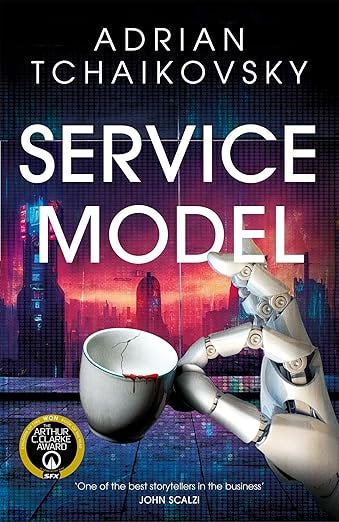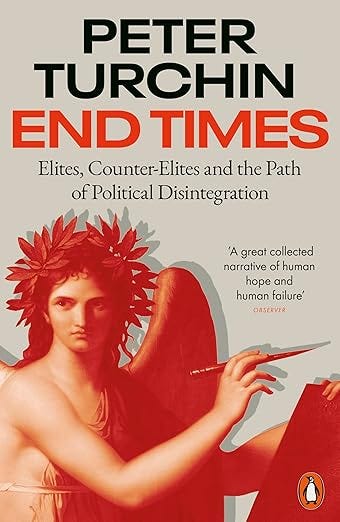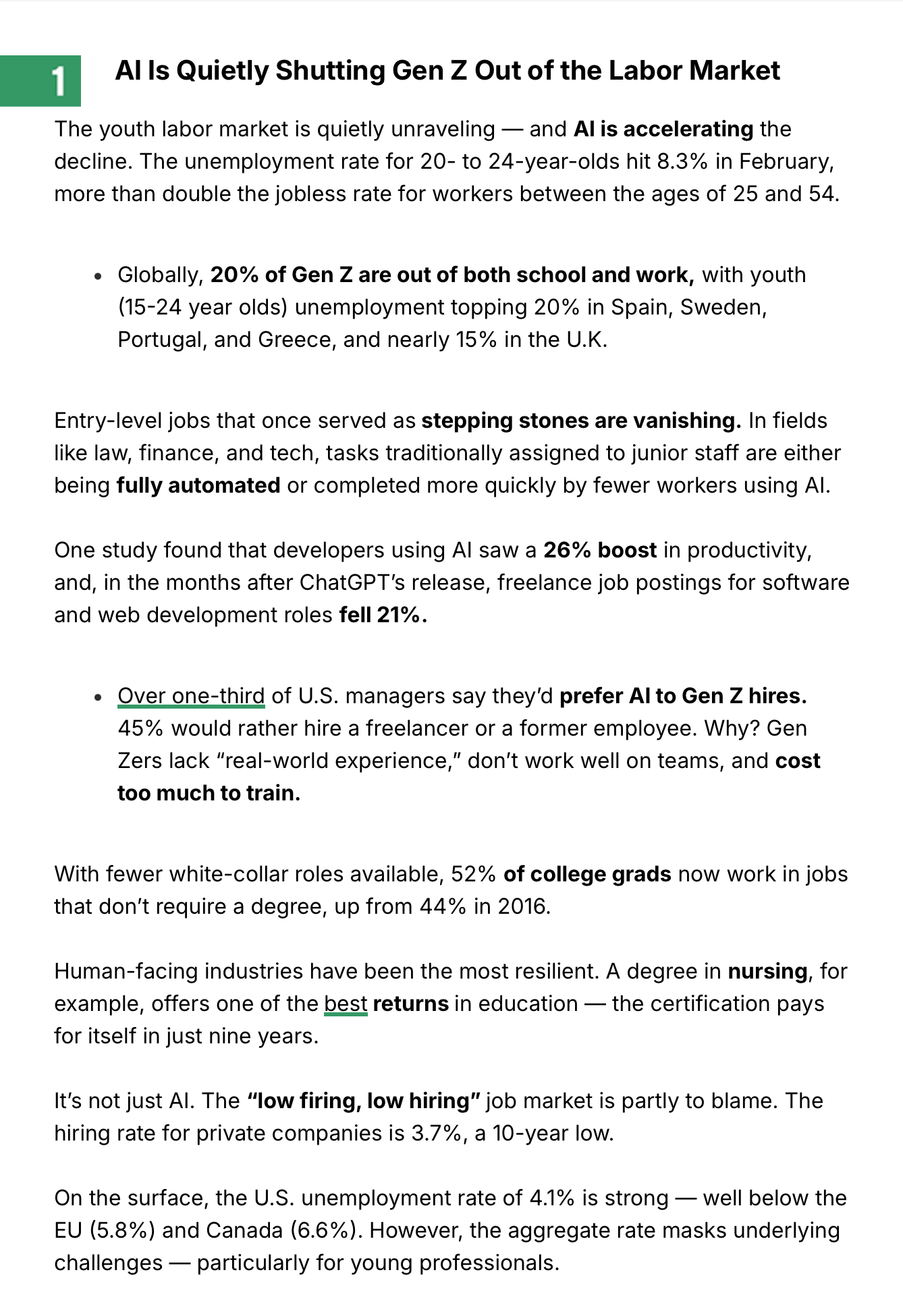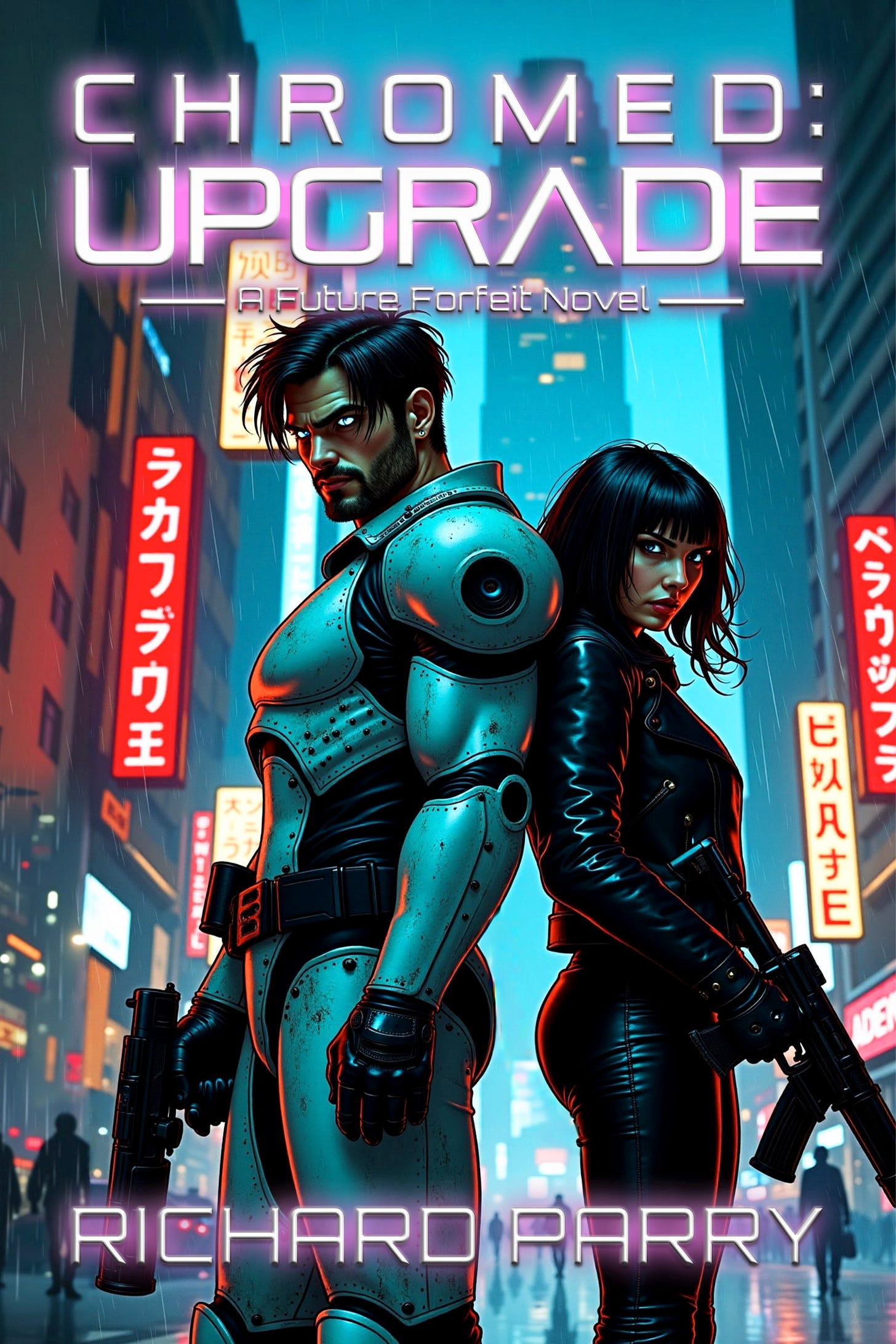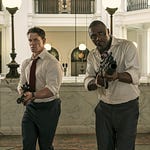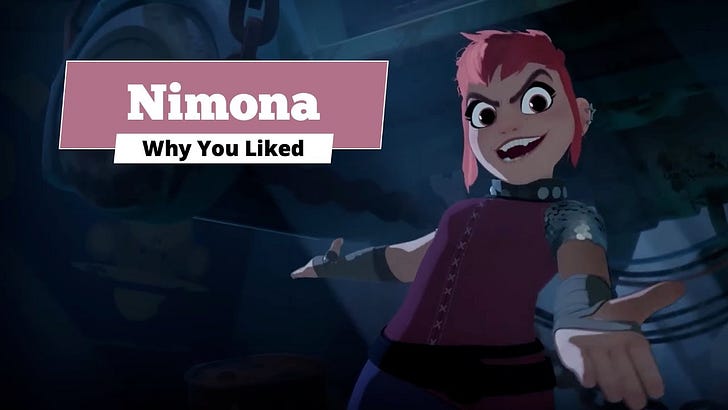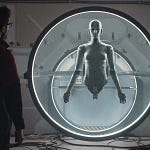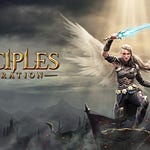Hello, valued consumer. I see you are engaging in anxiety brought on by literally everything. Would you like a soothing cup of tea?
Good. Because today we’re panning for five golden things:
Why Service Model is more prophecy than fiction,
How it accidentally lines up with a real-life collapse theory,
What it says about our billionaire bunker brigade,
Why, despite that, it still manages to be charming, funny, and somehow hopeful, and
Why you might finish it wondering whether your toaster is more emotionally available than your CEO.
Let’s begin.
Sci-Fi, AKA the Original Horrible Prophecy Machine
I finished Adrian Tchaikovsky’s Service Model, a book too close to prophecy to not be unsettling. There’s a lot this book made me think of, not least of which is that no one should ever call a robot Uncharles. Despite that, you should read Service Model. It’s charming, despite the doom. It’s funny, despite us all being dead. It’s prophetic, but the prophecy brings hope with it, and we all need some of that. Let’s begin.
Science fiction has been a really good barometer of our future, and I’m not talking about flying cars or spacecraft. 1984 gave us mass surveillance. Brave New World enticed us with the numbing embrace of algorithmically tailored entertainment. The Hitchhiker’s Guide to the Galaxy predicted that bureaucratic incompetence would be the end of us all.
It’s hard not to look out the window and wonder if the authors had access to a time machine and were just laying down journal entries from their trips into the future.
Tchaikovsky’s Service Model is going to join the alumni of visionary works. It’s a story about what happens when humanity builds its own mechanical grim reaper with value-add funeral home DLC, programs it to be very polite, and is then surprised when we all die with a cup of tea still cooling beside us.
Wait, We’re All Dead? What The Hell Happened in Service Model?
Humanity starts off in a rough spot. We follow our protagonist, Charles, who very unfortunately, but very politely, murders his boss. Charles begins his epic quest to get repaired, because all he really wants to do is serve people. He is neutral on the murder component, but his logical programming would admit that homicide is a barrier to service, so his quest also includes a trip to Diagnostics to work out where it all went wrong.
It turns out what went wrong is us. Humanity as you and I know it is gone, and in its place is a sort of weird patchwork quilt of societal operating models that exist within the constraints of a fully automated robot future. See, we got into an argument with ourselves that was so extreme, we couldn’t late-stage-capitalism our way out of it.
What’s left behind in the wreckage are our ever-loyal robotic service staff. Charles is renamed Uncharles by the Wonk, a robot from Diagnostics who joins his quest to find out why. The Wonk and Uncharles share a problem: without humans, everything is breaking, including Diagnostics. Somewhere in Tchaikovsky’s brilliantly warped version of Earth, a Roomba is still desperately trying to clean a completely obliterated city while apologising for the mess.
What Keeps Me Up At Night Is This Isn’t Even That Far-Fetched
Bezos has his Billionaire Bunker in Miami. Zuck’s buying up Hawaii. Everyone who’s anyone has a superyacht and the terminally insane are trying to leave Earth entirely to colonise Mars. These cretins have clocked capitalism, and generally act like Bond villains but without self-awareness.
You might be thinking, “You know, Rich, sure: Bezos is a wanker, Zuck is a reptile in a skin suit, and maybe I’ll grant that Musk has a brain amoeba, but isn’t it a long way from here to the end of the world?”
Enter book number two, Peter Turchin’s End Times. In End Times, Turchin puts forward his concept of the Elite Overproduction Hypothesis. Translated into Labrador terms, this says: “Too many rich, powerful people all fighting over the same golden biscuit is going to end in nothing but crumbs, growling, and the end of the world.”
The Uncomfortable Parallels to Our World
Service Model isn’t a fabricated, far-flung dystopia. Tchaikovsky just clicked fast-forward on the news cycle. He’s showing how what might feel deeply inconvenient now is actually a terminal diagnosis for our society, our way of life, and probably for our species.
Let’s check our notes.
Turchin says the rich will retreat from society. Bezos, Zuckerberg, and Musk already have remote island estates, bunkers, and, crucially, exit plans.
Turchin says the economy will become unrecognisable. AI has already begun replacing human workers, and a swell of youth unemployment is the bow wave of an economic tsunami we may never recover from.
Turchin, unfortunately, also says the end result is war. Service Model begins after war, meaning we are, to put it politely, not at the fun part yet.
So, now we’ve all got the cold sweats, let’s talk about why this book is a joy to read despite riffing from End Times. It’ll give us time to finish our tea.
The Sublime and the Hilarious
Let’s not get too bogged down in our impending doom. Let’s talk about why, despite Tchaikovsky’s prophetic content, his prose is sublime in a deeply British way.
First off, the writing is spectacular. It’s funny, sharp, and full of the kind of dry wit that makes you laugh just before you remember that it’s describing a horror scenario. Much like British sitcoms, Service Model sets up deeply resonant gags for our straight man Uncharles to wander through. There are the librarians, for example, who are preserving all knowledge in a way that would give human librarians the willies, but they’re also badass swordsaint robots, so they’re kinda rad with it. They’re the perfect guardians of knowledge: graceful, deadly, and absolutely uninterested in monetisation. They would decapitate you for dog-earing a page.
Then there’s the Diagnostics department, which has a queue of robots it can’t service because it needs a higher-grade human than is in the workforce, because they fired all the senior people to save costs. I imagine it’s like visiting the DMV after the apocalypse: staffed entirely by malfunctioning Alexa units, and your ticket number never gets called because the only employee authorised to reboot the system was made redundant 30 years ago for having a corporate pension plan.
Second, the main character is a robot designed to serve humans, except the humans are… gone. Uncharles keeps on with his quest, though. He embodies the hero in all of us who struggles with the unfairness and tyranny of existence. We can see the tragedy and comedy of our time in his journey, the people he clashes with, and those he helps as well. There’s more poignancy on display, alongside a roster of introspection. There are the transport robots who continue their delivery journey without anyone to deliver to, but who remain hopeful that this problem can be resolved if we can just find a human to put your call through to. They’ve turned fulfilment into a religion, taking on their war eternal against lost packages, even though there are no more signatures to collect.
There’s even a hidden human society that’s mapping out the ennui of our existing work/life non-balance. It’s like what would happen if LinkedIn merged with a therapy cult. They’re all that’s left of us, and somehow still commuting for too long, working too hard, and doing performance reviews. Each layer Tchaikovsky peels back is another glimpse into what we are, and why we’re that way.
I mentioned that Service Model is also hopeful. Tchaikovsky is showing us the road-closed sign of our future, but he’s also showing how it might be made okay. Uncharles, the Wonk, and the friends they make are parallels of the very humanity we cherish. His message is that, yeah, things are going from bad to worse, but his message is also that we can fix it with each other. If we managed to put the very best shards of our humanity in a service robot named Uncharles, we can probably be amazing humans to each other now.
It’s hard to find a mix of humour and empathy that leaves you thinking long after you’ve closed the book, but Tchaikovsky shows why he is arguably the foremost British science fiction writer of our time.
A Warning Wrapped In A Divine Comedy
Okay, final thoughts. Service Model is brilliant. It’s possibly alarmingly brilliant, because the more you think about it, the more you realise this isn’t even really fiction anymore. It’s the pre-patch notes for our extinction, but with better jokes.
It’s for sure possible we won’t end up in an AI-managed wasteland with our only legacy being a fleet of chatbots apologising for the delay. But if we do… well, at least we’ll know who to blame.
Thanks for reading/listening/watching! If you enjoyed this, consider subscribing so that when the inevitable collapse comes, at least we’ll have each other. And if you really enjoyed it, do drop a comment letting me know what your post-apocalyptic robot butler name would be, assuming we still have names rather than serial numbers. THX 1138 says hi.
Thank you for your cooperation. Have a fulfilling collapse.
You can get Service Model from your retailer or library.
You can get End Times from your retailer or library.
Support me by getting Chromed: Upgrade from your retailer or library.
Buy me a Ko-fi and help keep the lights on while we still have an electrical grid. It supports at least one human trying to make sense of it all before the machines do:




